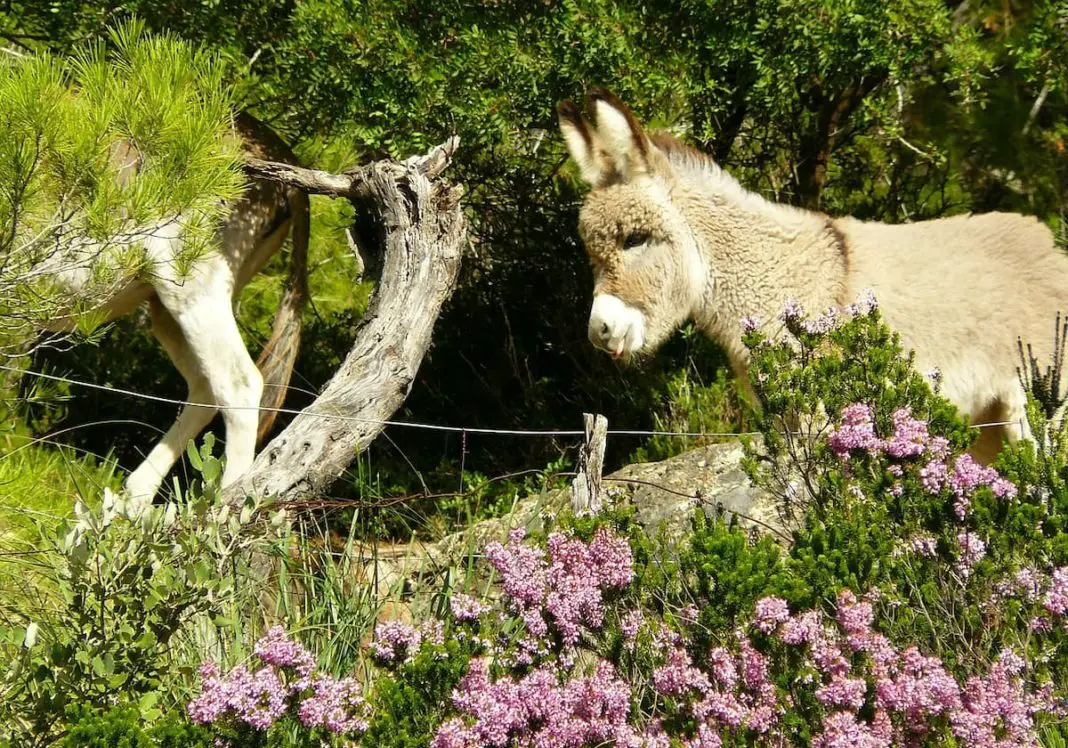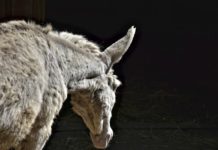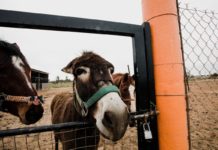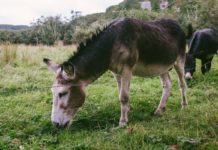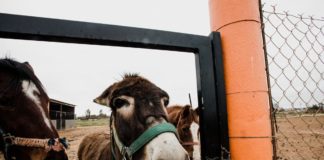Why Do Donkeys Eat Tree Bark?
A donkey that strips the bark of trees is considered stereotypic behavior, like cribbing. It’s more than likely that a donkey would have picked up this behavior from their previous home, or a sign of boredom.
Other than this behavior being destructive and annoying while also being lethal for trees, bark chewing isn’t typically “bad” for a donkey. However, a donkey is more prone to choke, as a piece of hard bark may lodge in their oesophagus. Intestinal impaction can also become a risk.
Their Forage Isn’t Satisfying Enough?
Scientists still don’t know why donkeys chew trees, but they have some theories. Trees—and wood in general—could complement a donkey’s nutritional needs, especially fiber if they’re lacking it.
Another reason for donkeys eating tree bark could be to seek water in the trees. Trees channel water up from the ground through a system of “capillaries” in the trunk, and a donkey could be trying to get some of that moisture—while destroying the bark in the process. But even a donkey whose nutritional needs are being met could chew bark and branches because they want the varied texture. In the wild, donkeys graze and browse a wide variety of plant types and species, including trees and bushes.
Another reason for tree chewing could be a form of self-medicating. Self-medication is an animal’s ability to use plant secondary compounds (PSC) or other non-nutritional substances to combat or control the disease.
Although there’s not much research into how equine self-medicate, experts know from other species—cattle, goats, and sheep, for example—those grazers will select a plant that seems to give some kind of relief for pain or a worm burden or even a pleasure effect. It would make sense that donkeys do this as well.
Although some owners of donkeys believe that they benefit from anti-inflammatory or pain-relieving effects of willow trees, for example, scientists can confirm this. It’s more probable that trees are a source of food fibers, as a lot of stable diets are poor in long fibers. Or they may simply like the smell or flavor of tree bark.
The Dangers of Donkeys Teeth For Trees
Tree bark stripping—especially if the donkey removes a full circle of bark around the trunk—could be deadly for trees. Donkeys can also do significant damage to tree cores with their sharp front teeth.
The biggest difference between cattle and equine regarding their grazing anatomy is their dental structure. Cattle only have lower incisors, while donkeys have upper and lower incisors. Cattle use their tongues to graze grasses and forbs a lot more than donkeys. The donkeys, two pairs of incisors, enable them to graze selectively and bite plants closer to the ground, but it also allows them to harm and remove tree bark. So, cattle aren’t able to bite the bark to the extent that donkeys do.
Protecting Your Trees
The simplest and most effective way to protect trees from donkey’s teeth is fencing them off out of reach. You can block individual trees with standard fencing or use an electric fence ribbon around a row of trees. Or you could even get creative with tree guards, using palettes or wire mesh (provided you’re watching out for entanglement risks or injury from stray wires).
However, only fencing off trees will only satisfy the needs of the trees. Preventing donkeys from eating trees could be denying them from accessing the resource they need. A suitable alternative would be to use a method called ‘cut and carry’. You could take large and small branches from various trees and put those in the donkey’s enclosure. This allows them to meet their tree-chewing needs—whatever those might be—but on your terms and without stripping the main part of the tree.
Some kinds of trees are toxic to donkeys, however, she added, so check science-based guidelines on suspected tree toxicities, specifically for donkeys, which are more sensitive to toxins than other grazers due partly to their single stomach. The American Society for the Prevention of Cruelty to Animals has an extensive list of poisonous trees and plants.
Are Oak Trees Safe For Donkeys?
Oak trees could potentially be toxic for donkeys, although farm animals like cattle seem to be more sensitive. Oak leaves, buds, and acorns contain a chemical called tannins which, if eaten and digested, could cause both renal and gastrointestinal damage. Fortunately, the bark of oak trees is non-toxic and donkeys rarely like the taste of acorns or oak leaves. Also, a few nibbles of oak tree leaves or a mouthful of acorns isn’t enough to cause toxicity for a donkey. Oak toxicosis for equines is usually only seen in starvation cases, where there is absolutely nothing else in the pasture for them to eat.
While the chewing of tree bark could be considered as a form of pica (a tendency to each substances other than normal food).
If you want to prevent your donkey from eating tree bark, consider putting a salt/mineral block out in the field. Although some donkeys may crave more salt in their diet than other donkeys, conversely, some donkeys may not touch a salt block at all. The old-fashioned fence around an open tree may end up being the easiest method of all, that is, if all the trees are conveniently clustered together or if there are only a few!
As donkeys are plant eaters, plants, not just grass. So, a donkey is likely to nibble on trees now and then.
Some donkeys may do more than nibble. A donkey could strip an entire adult tree of bark within a few days and even bite into the wood beneath, destroying the tree.
The donkey may have his reasons for chewing trees—possibly responding to physical or mental needs—but your trees shouldn’t have to pay the price. Here are some reasons your donkey may chew trees, how they do it, and tips on protecting your trees while keeping your donkey’s needs in mind.
Conclusion
Many donkeys seem to enjoy chewing on tree bark, although scientists still don’t have a clear understanding as to why. They’re capable of causing great destruction to trees, so handlers need to take caution in protecting trees from donkey bites. To meet their tree-chewing needs, owners can ensure their donkeys are getting enough fiber and water and can supplement their donkey’s diet with cut branches from non-toxic trees.

